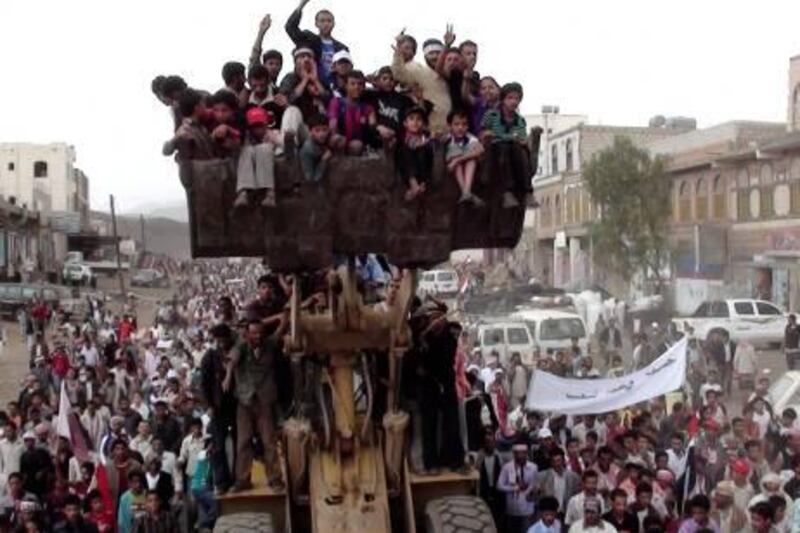SANA'A // The main Yemeni opposition group last night signed the Gulf Cooperation Council deal that would see President Ali Abdullah Saleh step down after 32 years in power, an opposition source said.
The signing, which was overseen by the GCC secretary general and the US, EU and UAE ambassadors, came hours after Mr Saleh, criticized the peace deal as a "coup". The president contradicted himself soon after by saying he would sign the proposal today. Mr Saleh has backed out of signing the GCC deal several times in recent weeks and erratic remarks in a televised speech yesterday have cast in doubt his pledge to sign.
In his speech, Mr Saleh claimed that al Qa'eda would overrun the country if he stepped down. He also accused the GCC of funnelling cash to anti-government protesters who are "plotting to take over power at the expense of spilling rivers of blood". Mr Saleh warned Western governments that his regime was the only stabilising force in Yemen and alleged that they were seeking "weak, loyal regimes".
"This is the message that I send to our friends and brothers in the United States and the European Union … my successor will be worse than what we have currently …. My departure of the regime will mean the departure of democracy and unity," he said.
Yet Mr Saleh, in the same speech, said he would approve the GCC proposal in order to "save the blood of Yemenis".
"We welcome the Gulf initiative and we say that we will work with it in a positive way for the sake of our homeland [although] in reality it is a mere coup operation … and part of foreign pressures and agendas," said Mr Saleh, speaking at a military ceremony at his security compound.
He added that the number of protesters killed since the demonstrations began three months ago is 145 with 3,318 people injured. Media reports put the death toll at over 180. Mr Saleh said that 154 members of the security forces had been killed during the same time and 1,327 had been wounded.
In recent days, Mr Saleh's ruling General People's Congress (GPC) and the main opposition coalition, known as the Joint Meeting Parties (JMP), had confirmed they would sign the GCC deal. They said five officials from each group would sign the pact and Mr Saleh would include his name as leader of the ruling party and head of state.
Sultan al Barakani, the GPC assistant secretary general, said the president and their party officials would sign the deal today.
Mr Saleh's controversial speech came hours before Abdullatif al Zayani, secretary-general of the GCC, arrived in Sana'a to witness the signing by the opposition and, according to sources close to the negotiations, make a final plea for the embattled leader to end the crisis. Mr Zayani left Sana'a on Wednesday after negotiations between the government and the opposition fell apart.
The proposal would give Mr Saleh immunity from prosecution if he steps down within 30 days of signing the deal. It also calls for a national unity government led by the opposition and including Mr Saleh's ruling party. Presidential elections would be held within 60 days of an interim president taking office.
Mr Saleh backed off singing the deal at least twice before, seeking to attach conditions including an end to the street protests before he steps down and the return to duty of army officers who defected.
The deal is unpopular with many of Mr Saleh's opponents and it is unclear if the president's signature on it would be enough to end the massive protests in the streets. Some leaders of the youth movements organising protests around the country have said the opposition parties taking part in the talks do not represent them.
They object to Mr Saleh being shielded from prosecution and want to see him brought to trial on charges of corruption and ordering the killings of demonstrators.
malqadhi@thenational.ae
* With additional reporting by the Associated Press





